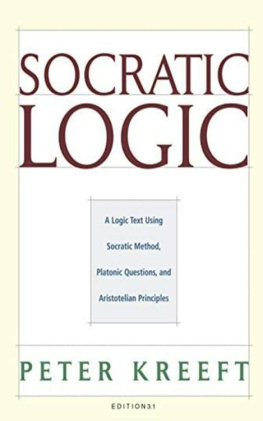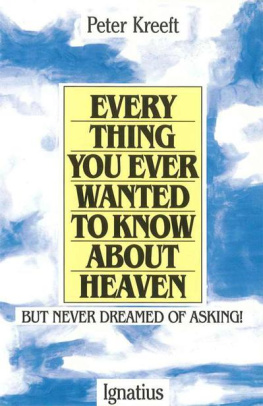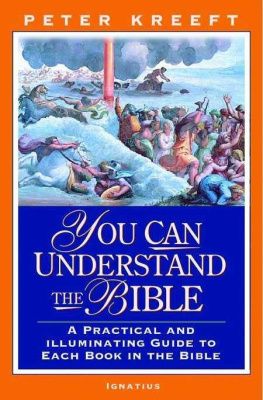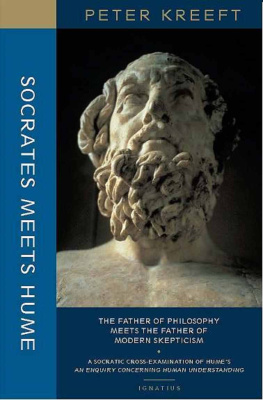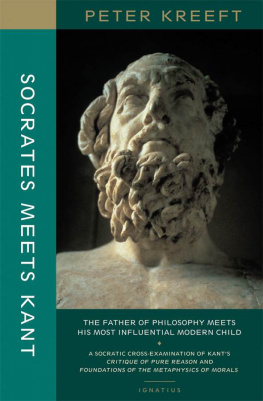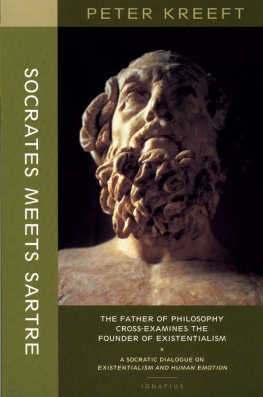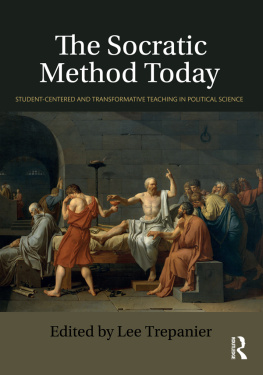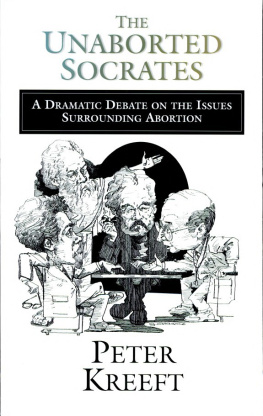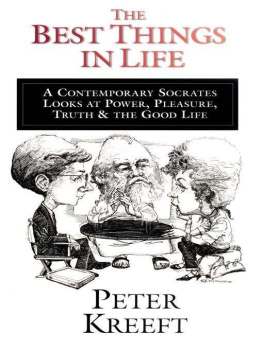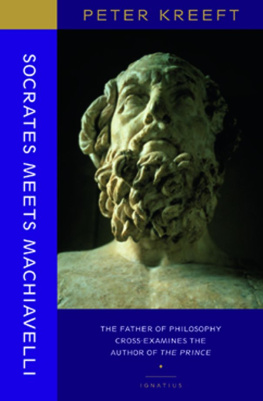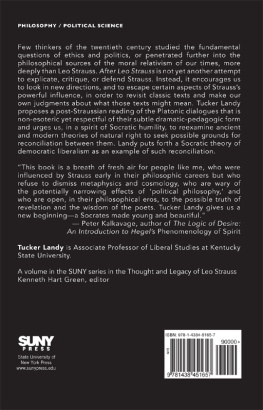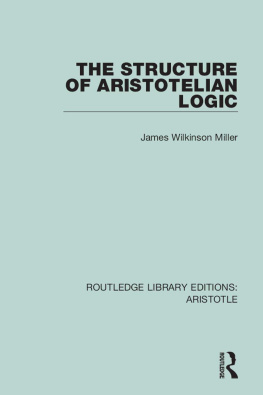Peter Kreeft - Socratic Logic: : A Logic Text using Socratic Method, Platonic Questions, and Aristotelian Principles, Edition 3.1
Here you can read online Peter Kreeft - Socratic Logic: : A Logic Text using Socratic Method, Platonic Questions, and Aristotelian Principles, Edition 3.1 full text of the book (entire story) in english for free. Download pdf and epub, get meaning, cover and reviews about this ebook. year: 2022, publisher: St. Augustines Press, genre: Religion. Description of the work, (preface) as well as reviews are available. Best literature library LitArk.com created for fans of good reading and offers a wide selection of genres:
Romance novel
Science fiction
Adventure
Detective
Science
History
Home and family
Prose
Art
Politics
Computer
Non-fiction
Religion
Business
Children
Humor
Choose a favorite category and find really read worthwhile books. Enjoy immersion in the world of imagination, feel the emotions of the characters or learn something new for yourself, make an fascinating discovery.
- Book:Socratic Logic: : A Logic Text using Socratic Method, Platonic Questions, and Aristotelian Principles, Edition 3.1
- Author:
- Publisher:St. Augustines Press
- Genre:
- Year:2022
- Rating:4 / 5
- Favourites:Add to favourites
- Your mark:
- 80
- 1
- 2
- 3
- 4
- 5
Socratic Logic: : A Logic Text using Socratic Method, Platonic Questions, and Aristotelian Principles, Edition 3.1: summary, description and annotation
We offer to read an annotation, description, summary or preface (depends on what the author of the book "Socratic Logic: : A Logic Text using Socratic Method, Platonic Questions, and Aristotelian Principles, Edition 3.1" wrote himself). If you haven't found the necessary information about the book — write in the comments, we will try to find it.
Peter Kreeft: author's other books
Who wrote Socratic Logic: : A Logic Text using Socratic Method, Platonic Questions, and Aristotelian Principles, Edition 3.1? Find out the surname, the name of the author of the book and a list of all author's works by series.
Socratic Logic: : A Logic Text using Socratic Method, Platonic Questions, and Aristotelian Principles, Edition 3.1 — read online for free the complete book (whole text) full work
Below is the text of the book, divided by pages. System saving the place of the last page read, allows you to conveniently read the book "Socratic Logic: : A Logic Text using Socratic Method, Platonic Questions, and Aristotelian Principles, Edition 3.1" online for free, without having to search again every time where you left off. Put a bookmark, and you can go to the page where you finished reading at any time.
Font size:
Interval:
Bookmark:
Jesus-Shock
The Sea Within: Waves and the Meaningof All ThingsI Surf
If Einstein
Socrates'
Socrates'
Socrates'
ThereforeI Am
Had Been a Surfer
Children:Medieval
Children:Modern
Philosophy
Socrates
101 by Socrates
MeetsDescartes
SocratesMeetsFreudSocratesMeetsHume
SocratesMeetsKantSocrates
Socrates
MeetsKierkegaardMeetsMachiavelli
Sumrna PhilosophicaSocrates'Students
The PlatonicTradition
by Peter Kreeft
A LOGIC TEXT USINGSOCRATIC METHOD,PLATONIC QUESTIONS, &ARISTOTELIAN PRINCIPLES
Modeling Socratcs as the ideal teacher for the beginnerand Socratic method as the ideal methodIntroducing philosophical issues along with logicby being philosophical about logic and logical about philosophyPresenting a complete system of classical Aristotelian logic,the logic of ordinary language and of the four language arts,reading, writing, listening, and speaking
ST AUGUSTINE'S PRESSAll rights reserved. No part of this book may be reproduced,stored in a retrieval system, or transmitted, in any form or by anymeans, electronic, mechanical, photocopying, recording, or otherwise,without the prior permission of St. Augustine's Press.
Manufactured in the United States of America345620191817161514Library of Congress Cataloging in Publication DataKreeft, Peter.
Socratic logic:
a logic text using Socratic method, Platonic questions & Aristotelianprinciples / by Peter Kreeft; edited by Trent Dougherty. - Ed. 3.1.p. cm.
Previously published: 3rd ed. c2008.
Includes bibliographical references and index.ISBN 978-1-58731-808-5 (hardcover: alk. paper)1. Logic.I. Dougherty, Trent. II. Title.
BC108.K67 2010
160 - dc222010032937
ooThe paper used in this publication meets the minimum requirementsof the American National Standard for Information Sciences - Permanenceof Paper for Printed Materials, ANSI Z39.48-1984.
ST. AUGUSTINE'S PRESS www.staugustine.net PREFACEix
2. Concepts, terms and words (P)40
2. Fallacies of diversion80
3. Fallacies of oversimplification86
4. Fallacies of argumentation92
5. Inductivc fallacies100
6. Procedural fallacies104
7. Metaphysical fallacies109
8. Short Story: "Love Is a Fallacy"114
IV. DEFINITION123
1. The nature of definition (B)123
2. The rules of definition (B)124
3. The kinds of definition124
4. The limits of definition129
V. THE SECOND ACT OF THE MIND: JUDGMENT138
1. Judgments, propositions, and sentences138
2. What is truth? (P)143
3. The four kinds of categorical propositions (B)145
4. Logical form (B)147
5. Euler's circles (B)152
6. Tricky propositions153
7. The distribution of terms163
VI. CHANGING PROPOSITIONS166
1. Immediate inference166
2. Conversion (B)167
3. Obversion (B)170
4. Contraposition171
VII. CONTRADICTION173
1. What is contradiction? (B)173
2. The Square of Opposition (B)174
3. Existential import (P)179
4. Tricky propositions on the Square181
5. Some practical uses of the Square of Opposition183
VIII. THE THIRD ACT OF THE MIND: REASONING186
1. What does "reason" mean? (P)186
2. The ultimate foundations of the syllogism (P)187
3. How to detect arguments190
4. Arguments vs. explanations193
5. Truth and validity194
IX. DIFFERENT KINDS OF ARGUMENTS200
1. Three meanings of "because"200
2. The four causes (P)202
3. A classification of arguments205
4. Simple argument maps (B)206
5. Deductive and inductive reasoning (B)210
6. Combining induction and deduction: Socratic method (P)211
X. SYLLOGISM S215
1. The structure and strategy of the syllogism (B)215
2. The skeptic's objection to the syllogism (P)219
3. The empiricist's objection to the syllogism (P)222
4. Demonstrative syllogisms230
5. How to construct convincing syllogisms (B)232
XI. CHECKING SYLLOGISMS FOR VALIDITY237
1. By Euler's Circles (B)237
2. By Aristotle's six rules (B)242
3. "Barbara Celarent": mood and figure257
4. Venn Diagrams258
XII. MORE DIFFICULT SYLLOGISMS264
1. Enthymemes: abbreviated syllogisms (B)264
2. Sorites: chain syllogisms275
3. Epicheiremas: multiple syllogisms (B)279
4. Complex argument maps282
3. The practical syllogism: arguing about means and ends296
4. Disjunctive syllogisms (B)301
5. Conjunctive syllogisms (B)303
6. Dilemmas (B)306
XIV. INDUCTION313
1. What is induction?313
2. Generalization315
3. Causal arguments: Mill's methods319
4. Scientific hypotheses325
5. Statistical probability328
6. Arguments by analogy329
7. A fortiori and a minore arguments335
XV. SOME PRACTICAL APPLICATIONS OF LOGIC342
1. How to write a logical essay342
2. How to write a Socratic dialogue344
3. How to have a Socratic debate348
4. How to use Socratic method on difficult people350
5. How to read a book Somatically355
XVI. SOME PHILOSOPHICAL APPLICATIONS OF LOGIC358
1. Logic and theology (P)358
2. Logic and metaphysics (P)359
3. Logic and cosmology (P)360
4. Logic and philosophical anthropology (P)361
5. Logic and epistemology (P)362
6. Logic and ethics (P)362
APPENDIX: PROBLEMS WITH MATHEMATICAL LOGIC364
1. Basic modern logic364
2. The paradoxes of material implication366
3. Responses to the paradoxes of material implication367
Once upon a time in Middle-Earth, two things were different: (1) most students learned "the old logic," and (2) they could think, read, write, organize, andargue much better than they can today. If you believe these two things are notconnected, you probably believe storks bring babies.
It is time to turn back the clock. Contrary to the cliche, you can turn backthe clock, and you should, whenever it is keeping bad time. (I learned that, andthousands of other very logical paradoxes, from G.K. Chesterton, the 20th-century Socrates.)
As I write this, it is the last Sunday of October, and we have just turned backour clocks from daylight savings time to standard time. This is a parable for whatI am convinced we must do in logic. The prevailing symbolic/mathematical logicis a logic that a computer can do; it is artificial, like daylight savings time. It isvery useful where there is already much intelligence (in the minds of geniuses,especially in science),just as daylight savings time is very useful in the summerwhen there is a plenitude of sunlight. But as the sunlight of clear thinking, writing, reading, and debating decreases in our society, it is time to make progressby turning back the clock from "daylight savings time" to real time, real language, real people, and the real world. The old Socratic-Platonic-Aristotelianlogic is simply more effective than the new symbolic logic in helping ordinarypeople in dealing with those four precious things.
This text differs from nearly all other logic texts in print in the three wayssuggested by the subtitle. It does this by apprenticing itself to the first three greatphilosophers in history, Socrates, Plato, and Aristotle. (Do we have better onestoday?)
Next pageFont size:
Interval:
Bookmark:
Similar books «Socratic Logic: : A Logic Text using Socratic Method, Platonic Questions, and Aristotelian Principles, Edition 3.1»
Look at similar books to Socratic Logic: : A Logic Text using Socratic Method, Platonic Questions, and Aristotelian Principles, Edition 3.1. We have selected literature similar in name and meaning in the hope of providing readers with more options to find new, interesting, not yet read works.
Discussion, reviews of the book Socratic Logic: : A Logic Text using Socratic Method, Platonic Questions, and Aristotelian Principles, Edition 3.1 and just readers' own opinions. Leave your comments, write what you think about the work, its meaning or the main characters. Specify what exactly you liked and what you didn't like, and why you think so.

